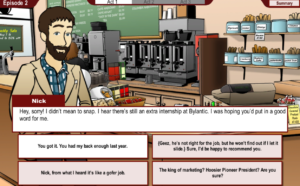Say a friend asks you to recommend them for an internship, but you have doubts about their abilities. What should you do?
You have a few options: You could refuse, you could recommend him or her anyway, or you could say that you’ll recommend them — and then don’t.
It’s a sticky situation, and not everyone agrees on the best course of action. But at the Indiana University Kelley School of Business, undergraduate business majors in a required upper-level ethics course must come up with an answer. To help them out, students are introduced to a video game called “The Crimson Dilemma.”
‘LIKE A FLIGHT SIMULATOR, BUT FOR ETHICS’
The Crimson Dilemma is an online, interactive role-player game that takes Kelley students through two episodes of tough choices. In one, the game simulates an internship at a pharmaceutical company, and the player encounters ethical conundrums like recommending or not recommending a friend for an internship. The rest of the game changes based on the player’s decisions.
“We try to put students in real-world situations,” says Todd Haugh, assistant professor of business law and ethics at Kelley. “The Crimson Dilemma is our best attempt to come up with a way for them to engage with these topics in as real-world a way as possible.
“It’s like a flight simulator, but for ethics.”
CREATING THE CRIMSON DILEMMA
The Crimson Dilemma was first used in Kelley ethics classes in 2014, but development of the game has been ongoing since 2012, when the Eveleigh family gifted the school with a donation earmarked for the creation of an ethics simulation. A team of professors teamed up with Simcoach Games, an educational game development company, to design the game and come up with the kind of dilemmas business students are likely to encounter in their careers.
Tim Fort, a Kelley professor of business law and ethics who holds the Everleigh chair in business ethics, was on the team that helped design the game. “We had a group of six or seven faculty members who would meet every week during the summer, and we threw out a set of ideas and dilemmas from our own experiences — just brainstorming. It was a collective effort, and after about a year of that, we brought in an outside consultant who helped us tighten things up,” Fort says.
Two episodes of the game — Episodes 2 and 3 — are complete and currently used in classrooms. Haugh says more are coming. “Episode 2 takes the student through their internship, and Episode 3 is back on campus for their senior year. The idea is to do a prequel episode next, which may be something we offer to the larger community for free,” he says.
“And down the road we would like to make episodes that target specific industries or career tracks.”
‘WE’RE NOT QUITE AS ETHICAL AS WE THINK WE ARE’
The Crimson Dilemma is not meant to teach right or wrong, Haugh says, or to alter students’ values. Instead, it’s meant to help students understand how their thought processes work and that sometimes, when people are in difficult positions, they might not realize that they’re making decisions with ethical ramifications.
“All the data, and also much of our anecdotal information, tells us that we often think we’re very ethical,” Haugh says. “But we’re not quite as ethical as we think we are. That’s pretty much a truism at this point.”
Fort says ethics are the principles that govern relationships, which are particularly important for people going into business. He can’t imagine a business being successful without strong relationships.
“Ethics is about interpersonal relations — how you interact with your customers, your shareholders, your employers. And we don’t often spend time thinking about how those relationships are fostered,” Fort says. “But this game gives students the opportunity to think through our interactions with other humans.”














Questions about this article? Email us or leave a comment below.